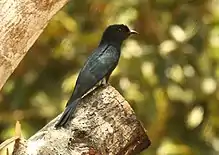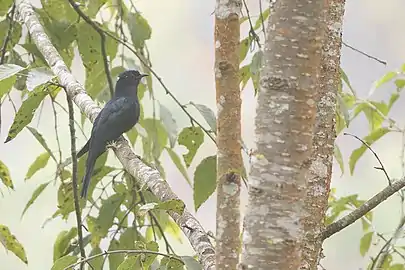Square-tailed drongo-cuckoo
The square-tailed drongo-cuckoo (Surniculus lugubris) is a species of cuckoo that resembles a black drongo. It is found in Sri Lanka and Southeast Asia and is a summer visitor to the Himalayas from Kashmir to eastern Bangladesh. The calls are series of piercing sharp whistles rising in pitch but shrill and choppily delivered.[2]
| Square-tailed drongo-cuckoo | |
|---|---|
 | |
| Khao Yai National Park - Thailand | |
| Scientific classification | |
| Kingdom: | Animalia |
| Phylum: | Chordata |
| Class: | Aves |
| Order: | Cuculiformes |
| Family: | Cuculidae |
| Genus: | Surniculus |
| Species: | S. lugubris |
| Binomial name | |
| Surniculus lugubris (Horsfield, 1821) | |
Description
It can be easily distinguished by its downcurved beak and the white barred vent and outer undertail, and the tail only notched with slightly flared tips. In flight a white wing-stripe is visible from below. It is a brood parasite on small babblers. It is not known how or whether the drongo-like appearance benefits this species but it is suspected that it aids in brood-parasitism just as hawk-cuckoos appear like hawks.[3]
The square-tailed drongo-cuckoo was formerly considered conspecific with the fork-tailed drongo-cuckoo (together known as the Asian drongo-cuckoo), but vocal and morphological differences suggested that the species should be split.[2][4] That treatment is followed here.
References
- "Surniculus lugubris". IUCN Red List of Threatened Species. Retrieved 2014-12-31.
- Rasmussen, P. C. & Anderton, J. C. 2005 Birds of South Asia. The Ripley Guide. Smithsonian and Lynx Edicions
- Davies NB & Welbergen JA (2008). "Cuckoo-hawk mimicry? An experimental test" (PDF). Proc. Biol. Sci. 275 (1644): 1817–1822. doi:10.1098/rspb.2008.0331. PMC 2587796. PMID 18467298. Archived from the original (PDF) on 2011-06-03.
- Fu-Min, Lei & Robert B. Payne (2002) Territorial songs of the drongo cuckoo complex (Surniculus lugubris & S. velutinus). The Raffles Bulletin of Zoology 50(1):205-213 PDF

